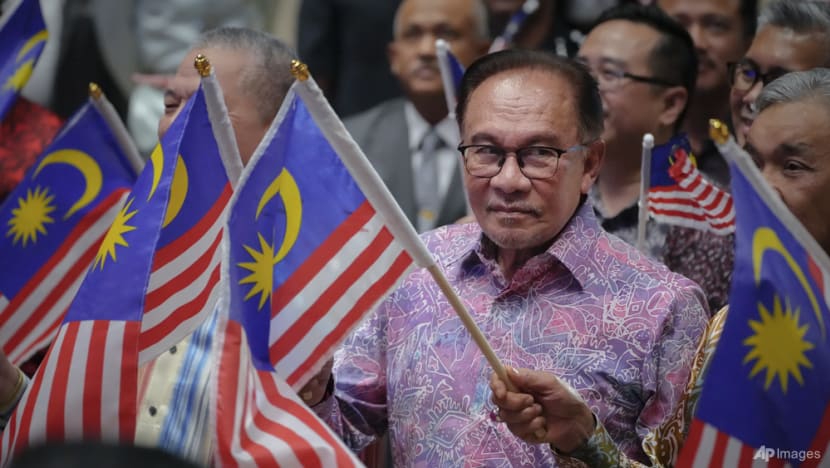Malaysian PM Anwar marks first year anniversary with economy on track but popularity down
While observers say the Anwar administration has made some strides, approval ratings among voters have dropped.

FILE: Malaysian Prime Minister Anwar Ibrahim waves the Malaysian national flag after delivering his speech for National Day at a convention centre in Putrajaya, Malaysia August 30, 2023. (File Photo: AP Photo/Vincent Thian)

This audio is generated by an AI tool.
KUALA LUMPUR: Malaysian Prime Minister Anwar Ibrahim's government is celebrating its first-year anniversary this weekend.
Observers say the administration has made some strides, especially in achieving stability among coalition partners and keeping its economic growth on track to meet its full-year target.
However, they cautioned more work needs to be done to win over the support of Malaysians.
Indeed, while some analysts have given Mr Anwar a positive report card, approval ratings have dropped since last year, with voters citing economic concerns as the biggest issue.
His popularity in October was at 50 per cent, a steep drop from last December, when – fresh from being sworn in as the country’s 10th prime minister – he commanded a 68 per cent approval rating.
The survey by research firm Merdeka Center also showed that dissatisfaction over the government’s handling of the economy rose to 43 per cent from 19 per cent.
RIVALS TURNED ALLIES
A year ago, after Malaysia's 15th General Election resulted in a hung parliament, Mr Anwar’s Pakatan Harapan (PH) coalition teamed up with once bitter rivals Barisan Nasional (BN), as well as parties from Sabah and Sarawak, to form a so-called unity government.
It was a political alliance that raised eyebrows, and there were doubts the union would last.
But as the dust settles one year on, political observers say relations within the Madani government have been positive – the cabinet appears to be united and cohesive.
Malaysia Madani, or Civil Malaysia, a slogan conceptualised by the Anwar administration is an acronym made up of six core values, namely sustainability, prosperity, innovation, respect, trust and compassion.
“The best benchmark is you compare it to the first PH government in 2018. Back then, there were a lot more public disagreements on core issues and fundamental issues, which eventually led to its collapse,” said Mr Adib Zalkapli, director of public policy consulting firm BowerGroupAsia.
He was referring to PH under former prime minister Mahathir Mohamad, who won the 2018 general elections, but infighting caused the ruling coalition to collapse in 2020.
“In that sense, they (Anwar’s government) have improved a lot. Some members of the political parties learnt to compromise and work with their long-term enemies. They learnt to govern, to prioritise their fights and pick their battles,” Mr Zalkapli said.
HANDLING OF THE ECONOMY
The Madani government also took the reins amid a challenging global economy, when investors were holding back and the cost of living was increasing rapidly.
Revitalising the economy and an urgency to actively attract foreign investors became paramount objectives for the Anwar administration.
Authorities also launched a series of industrial plans and policy roadmap, which aim to steer the country towards a more defined future.
“The uncertainties and inconsistencies have now been more or less resolved … they have stabilised things and managed to project the ability to govern over the past year,” said Mr Amir Fareed Rahim, strategy director at KRA Group, an ASEAN-focused public affairs and political risk consultancy.
“But of course, there is a lot of room for improvement. There needs to be greater cohesion within the cabinet, in terms of delivering on some of its promises. There needs to be a proud, real push to prioritise the performance of the domestic economy.”
Malaysia’s economy grew faster than expected in the last quarter, putting it in line to meet the government's target of 4 per cent this year.
RECAPTURING THE MALAY VOTE
The Madani government’s political strength was tested in August when six states held regional polls.
The electoral battle ended in a stalemate with the PH-BN alliance and opposition alliance Perikatan Nasional (PN) retaining their respective states.
Despite the status quo, PN made inroads with Malay-majority constituencies. This outcome highlighted a concerning trend – the obvious decline in support for the ruling coalition from Malay voters.
Analysts said that multi-ethnicity in Malaysia’s political scene is increasingly looking like a liability for politicians.
“This has nothing to do with whether this government can deliver our bread and butter, if they can lower the prices and so on,” said Mr Wong Chin Huat, a political scientist at Sunway University.
“Even if the government manages the economy well, the opposition will have plenty of ways to force the Malay voters to ask: ‘Do you want to choose a Malay-dominated government, or one that is small and multi-ethnic?’”
In an interview with local media to mark his one year in power, Mr Anwar dismissed accusations that his administration was not Malay or Islamic enough.
To win back Malay votes, the United Malays National Organisation (UMNO), the dominant party within BN that was once considered the sacred party for the Malays, plans to bolster the Malay economic agenda through colloquiums and conventions.
Mr Anwar said a year is too short to fairly assess his government, adding that his ministers need to be given more time and opportunities to improve and boost their performance.
However, he did not rule out a cabinet reshuffle if the situation demanded it.






















